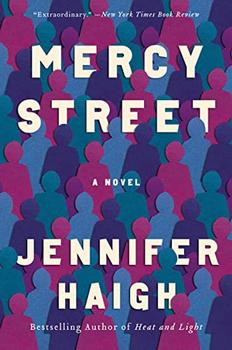Summary | Excerpt | Reviews | Beyond the Book | Readalikes | Genres & Themes | Author Bio

A Novel
by Jennifer Haigh
Deb considered toys a waste of money and took pleasure in saying so, but every year, for as long as Claudia can remember and somewhat against her mother's will, some unseen higher power sent a box of them a few days before Christmas. They weren't gift-wrapped and weren't meant to be surprises; Claudia had chosen them herself, after weeks of deliberation, from the pages of the Sears Christmas Wish Book. At her mother's insistence, she put her requests in writing—letters to Santa Claus and later, bulleted shopping lists, complete with item numbers and prices. When the package arrived, it would be the most momentous thing that happened all year.
The toys were shipped directly from Sears, and Claudia did not for many years understand that they were paid for by her father, that this was what he gave Deb in lieu of child support, a few twenty-dollar toys at Christmas.
For Christmas 1980 she chose a popular board game called The Bride Game. It quickly became her favorite, outranking a game called What Shall I Wear? and another one licensed by the Miss America Pageant, in which two to four girls, aged eight to twelve, competed for the crown. Claudia knew about these games entirely thanks to Justine Webster, who lived up the hill and whom she believed to be wealthy because she owned all three.
The games taught you what you were supposed to want.
At Damsel she passed on her knowledge. Have a professional tooth bleaching, a salon blowout, a session on the Reformer. A low-carb diet prevented bloating, premenstrual breakouts, mood swings, existential anguish. A low-carb diet was your friend for life.
She edited a column called Ask Damsel, in which leading beauty experts answered readers' questions. Because readers stubbornly refused to ask questions that appealed to Damsel's advertisers, Claudia invented the questions herself.
At the salon ask for highlights, ask for lowlights. Have a mani-pedi, a scalp massage, a Brazilian. How much money could be spent in the quest for perfection, the care and maintenance of a single female body? An upper limit has not been established.
You taught them what to want and so they wanted it.
Get a facial, a seaweed wrap, a few zaps with the pulse-dye laser. Do a five-day cleanse, a juice fast. Have your colon irrigated.
The upper limit was equal to the GDP of a small island nation.
The upper limit was an illusion. There was no upper limit. There was always more you could do. A woman could, theoretically, spend every waking moment making herself look better, as demonstrated by the one percent: the model/actresses, the pop stars, a small handful of elite prostitutes. The ornamental wives who could not, dared not, let themselves go.
Ask for highlights, ask for lowlights. Claudia knew the job was bullshit, but for a long time she didn't care. She had escaped her mother's trailer. She was performing a flattering version of her life.
She worked at Damsel longer than she should have. When she quit, she was replaced immediately. Twenty years later, the job was still being done. By whom exactly mattered not at all.
SHE MOVED TO BOSTON—THE PLACE MAINERS WENT WHEN there was some compelling reason to be in a city, such as needing a kidney transplant. In Boston she waited tables at Legal Sea Foods. In her spare time she went to grad school. She was still a student when she started volunteering at the call center, where there was no need, ever, to invent the questions. The questions never stopped.
By the winter of 2015, she'd worked on Mercy Street for nine years. As Access coordinator, she did the same work she'd once done for free—answering calls on the hotline—but now she had a retirement plan and health benefits and what passed for a full-time salary in the nonprofit world. She spent most of her day in the call center, fielding phone calls, training and managing the volunteers. Several times a week, she counseled Access patients in person. These were ABs with special circumstances: minors who needed parental consent; women with medical conditions that made terminating more complicated; latecomers who'd missed the legal cutoff, or were about to.
Excerpted from Mercy Street by Jennifer Haigh. Copyright © 2022 by Jennifer Haigh. Excerpted by permission of Ecco. All rights reserved. No part of this excerpt may be reproduced or reprinted without permission in writing from the publisher.




A few books well chosen, and well made use of, will be more profitable than a great confused Alexandrian library.
Click Here to find out who said this, as well as discovering other famous literary quotes!
Your guide toexceptional books
BookBrowse seeks out and recommends the best in contemporary fiction and nonfiction—books that not only engage and entertain but also deepen our understanding of ourselves and the world around us.